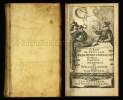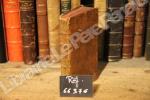-
Type
Book (374)
Magazine (13)
Music sheets (2)
New book (3)
Posters (1)
Public sale (1)
-
Language
English (3)
French (383)
Russian (8)
-
Century
17th (11)
18th (11)
19th (37)
20th (164)
21st (42)
-
Countries
Belgium (28)
Canada (2)
China (1)
Denmark (9)
France (328)
Germany (1)
Italy (2)
Netherlands (1)
Switzerland (9)
United Kingdom (5)
United States of America (8)
-
Syndicate
ALAC (2)
CLAM (4)
CNE (2)
ILAB (145)
NVVA (1)
SLACES (1)
SLAM (120)
Oeuvres philosophiques et morales
Le Lis 1978 Le Lis, 1978, 154 p., cartonnage éditeur, cartonnage insolé, bon état pour le reste et intérieur bien propre.
Réimpression de l'édition française de 1797 (les 2 tomes sont compris dans cette édition). Titre des chapitres contenus dans ce volume : Apologie des sciences, De l'abus des sciences, De la méthode, De la nature, de l'expérience, De la métaphysique, De la théologie, De la medecine, De l'histoire, Des langues, de l'éloquence, De quelques arts, Du scepticisme, De l'imagination, Des préjugés, Des passions, Du Bien De la vicissitude des choses humaines, Du gouvernement, De l'agrandissement des états, Ders trouvbles et des séditions, Du conseil, Des négociations, Des Dignités, De la noblesse, Des devoirs du juge, De l'usure, De l'ambition, Des richesses, De l'envie, De al dissimulation, De l'art de conserver et de représenter, De la vertu, Du naturel et de l'habitude, De la gloire et de l'ostentation, Du mariage et du célibat, Des pères et des enfants, De l'amour et de l'amitié, De la jeunesse et de la vieillesse, De la beauté et de la difformité, De l'athéisme et de la superstition, De l'espérance et de la mort, Instruction politique adressée à un ministre, Le chemin de la fortune, Aphorisme sur les lois, De la philosophie ancienne, La fable raisonné, Pensées et vues générales. Merci de nous contacter à l'avance si vous souhaitez consulter une référence au sein de notre librairie.
Oeuvres philosophiques et morales
Le lis Le lis, 1978. In-8 pleine reliure éditeur beige, titre doré en dos et sur le plat, 180 + 154 pages. Bon état
Toutes les expéditions sont faites en suivi au-dessus de 25 euros. Expédition quotidienne pour les envois simples, suivis, recommandés ou Colissimo.
Oeuvres philosophiques, morales et politiques de François [sic, Francis] Bacon.
Paris, Auguste Desrez, 1840. Un fort vol. au format in-4 (268 x 183 mm) de 1 f. bl., xvi - 788 pp. et 1 f. bl. Reliure de l'époque de demi-chagrin maroquiné ébène, dos à nerfs orné de filets gras en noir, doubles caissons d'encadrement gras et maigres dorés, doubles filets maigres dorés terminés par de petits fleurons dorés sur les nerfs, titre doré, tranches mouchetées.
Exemplaire revêtu d'une agréable reliure du temps. Il s'ouvre sur un tableau dépliant. ''Certain que l'entendement humain se suscitait à lui-même des difficultés, et qu'il ne savait point user, avec assez de modération et de dextérité, de ses ressources très réelles que a nature a mise à la portée de l'homme, que de cette source dérivent l'ignorance d'une infinité de choses et de maux sans nombre qu'elle traîne à sa suite, Bacon a pensé qu'il était de plus haut intérêt pour les générations présentes et à venir, de proclamer la nécessité de faire tous ses efforts pour restaurer entièrement s'il était possible ou du moins pour améliorer ce commerce que la science établit entre l'esprit et les choses.'' ''Francis Bacon est le père de l'empirisme sous sa forme moderne. Kant lui dédia à ce titre sa Critique de la raison pure. Il pose le premier les fondements de la science moderne et de ses méthodes, qu'il conçoit comme entreprise collective - ce qui le distinguera de la recherche solitaire prônée en grande partie par Descartes dans le Discours de la méthode - fondée sur l'observation des faits naturels, des arts et techniques et la recherche des causes naturelles.'' (Wikipedia). Quelques cahiers parfois légèrement oxydés. Quelques claires rousseurs dans le corps d'ouvrage ; davantage marquées aux premiers et derniers feuillets. Du reste, belle condition.
Opera omnia
Francfort, impensis Joannis Baptistae Schonwetteri, 1665. In-folio, [18] pp. 1324 col. [29] pp., veau marbré brun, triple filet doré en encadrement sur les plats cantonnés de fleurons dorés, dos à nerfs orné de caissons dorés, pièce de titre rouge, tranches rouges (reliure défraîchie mais solide, rousseurs, taches, pâles mouillures,petits manques au faux-titre qui est presque débroché).
Deuxième édition latine des oeuvres de Francis Bacon, la première en Allemagne. Elle comporte un portrait gravé de l'auteur en frontispice, une belle vignette à la page de titre générale. Chaque oeuvre possède sa propre page de titre datée de 1664 avec une vignette gravée. L'ensemble est précédé d'une notice biographique sur Bacon et se clôt sur un exhaustif index. Ex-libris héraldique, Antoine Louis, secrétaire perpétuel de l'Académie de chirurgie. Brunet, I, 604 "édition [...] plus complète que celle de Londres". Voir photographie(s) / See picture(s) * Membre du SLAM et de la LILA / ILAB Member. La librairie est ouverte du lundi au vendredi de 14h à 19h. Merci de nous prévenir avant de passer,certains de nos livres étant entreposés dans une réserve.
Opera Omnia, quae extant Philosophica, Moralia, Politica, Historica... In quibus complures alii Tractatus, quos brevitatis causa... jam vero summo studio collecta, uno volumine comprehensa, & ab innumeris Mendis repugata... His praefixa est Auctoris V...
Franckfurt am Main, Joannis Baptista Schonwetteri, 1665. Folio. Contemp. full vellum. Handwritten title to spine. Engraved portrait as frontispiece (engr. by S. Pass). Large engraved titlevignette. (10),(6) pp.+ 1324 columns (= 672 pp) + Index. Some offsettings to titlepage from a modern picture of St. Catherine's Church pasted on verso of title-page. A few notes in a large hand. Some browning and scattered brownspots.The different works collected having their own printed title-pages, dated 1664.
Second Latin edition of Bacon's Opera Omnia, the first London 1623.Brunet I:604 - Graesse I:273.
Opera. Tomus primus: Qui continet De Dignitate & Augmentis Scientiarum. Libros IX [i.e.: De Augmentis Scientiarum]. (All). - [A NEW FOUNDATION FOR SCIENCE]
London, Joannis Haviland, 1623 [later altered in manuscript to 1624]. Small folio. Bound in a lovely early 19th century full vellum binding with gilt borders to boards and gilt ornamentations and gilt title-label to spine.Lower front hinge cracked, but bindning still tight. A bit of edge wear, but overall very nice. Woodcut title-vignettes (burning heart) and woodcut initials in beginning. Text within single woodcut borders. (18), 493, (1 - errata) pp. Complete with both title-pages (no final blank). Old owner's name to title page (along with the dates 1624 and 1648), unlegible scribbles to second title-page, and ""collated e perfect"" in old hand to last leaf. A very nice and clean copy with good margins.
The extremely rare first edition of what is arguably Bacon's main work ""De Augmentis Scientiarum"", in which he sets out to lay the foundations of science entirely anew and reform the process of knowledge for the advancement of learning. Bacon believes that the advancement of learning will ultimately relieve mankind from its miseries and needs, and as such he not only reformed the foundations of science, he also laid the philosophical foundations for the dawning of the Industrial age. His proposed change of the collective thought of mankind completely reshaped the entire course of science in history. The aim of the present work - to investigate and re-classify philosophy and the sciences - marks a turning point in the rhetorical and theoretical framework for science, which is still essential for our conceptions of proper methodology today.The ""De Augmentis Scientarum"" constitutes a greatly expanded and completely re-written version of the ""Advancement of Learning"" (1605). The Latin is by William Rawley, in close collaboration with Bacon himself, who oversaw the entire process. When speaking of ""De Augmentis Scientiarum"" one never refers the incomparable English forerunner of the work (which was only in 2 books as opposed to the 9 of the ""De Augmentis Scientiarum""). The first English translation of the ""De Augmentis Scientiarum"" appeared in 1640 and is translated by Gilbert Wats as ""Of the Advancement and Proficiencie of Learning"".The ""De Augmentis Scientiarum"" was intended as Part 1 of Bacon's proposed, but never completed ""Instauratio magna"" (PMM 119). ""Bacon conceived a massive plan for the reorganization of scientific method and gave purposeful thought to the relation of science to public and social life. His pronouncement ""I have taken all knowledge to be my province"" is the motto of his work... [His] proposal was ""a total reconstruction of sciences, arts and all human knowledge... to extend the power and dominion of the human race... over the universe"". The plan for this was to be set out in six parts: (1) a complete survey of human knowledge and learning"" this was expounded in the ""De Augmentis Scientiarum"", 1623 (a greatly extended version of ""The Advancement of Learning"", 1605)... Of parts (3) to (5) only fragments were ever published"" part (6) remained unwritten."" (PMM 119 - the header being ""The Advancement of Learning""). Francis Bacon's Great Instauration for learning and the sciences was thus to be introduced by his most important work, the ""De Augmentis Scientiarum"", which he himself considered the most fundamental for the project that caused him to be considered one of the fathers of modern science. ""In ""De augmentis scientiarum"", which is concerned primarily with the classification of philosophy and the sciences, Bacon develops his influential view of the relation between science and theology. He distinguishes in traditional fashion between knowledge by divine revelation and knowledge by the senses, and divides the latter into natural theology, natural philosophy, and the sciences of man... Having placed his project within the complete framework of knowledge in true Aristotelian fashion, Bacon proceeds to demolish all previous pretentions to natural philosophy. His aim is to lay the foundations of science entirely anew, neither leaping to unproved general principles in the manner of the ancient philosophers nor heaping up unrelated facts in the manner of the ""empirics"" (among whom he counts contemporary alchemists and natural magicians). ""Histories,"" or collections of data, are to be drawn up systematically and used to raise an ordered system of axioms that will eventually embrace all the phenomena of nature.""... (D.S.B. I:374-75). For Bacon, this proposed reformation would lead to a great advancement in science and a progeny of new inventions that would relieve mankind of its miseries. His demand for a planned procedure of investigating all things natural marked a turning point in the rhetorical and theoretical framework for science, much of which still surrounds conceptions of proper methodology today.It is due to his ""De Augmentis Scientiarum"" that Bacon is referred to as the creator of empiricism. With this work and the work intended as the second of the Great Restauration project, the ""Novum Organum, Bacon established and popularized inductive methodologies for scientific inquiry, that which we now call the Baconian method, or quite simply ""the scientific method"". With his belief in the possibility of the advancement of learning of relieving mankind from its miseries and needs, Bacon is furthermore considered the philosophical influence behind the dawning of the Industrial age. He continually proposes that all scientific work should be done for charitable purposes, as matter of alleviating mankind's misery, and that therefore science should be practical and have the purpose of inventing useful things that will improve the conditions of mankind. This proposed change of our collective mind changed the entire course of science in history. The state was no longer merely contemplative"" it became a practical and inventive state - one that would have eventually led to the inventions that made possible the Industrial Revolutions of the following centuries.It is furthermore to be noted that it is in the present work that Bacon presents his cipher method for the first time. He had first mentioned the Biliteral Cypher in a brief paragraph of his ""Advancement of Learning"" in 1605, but it is in the present work that he details with illustrations how to write and use the Biliteral Cypher. As most will know, Bacon's Cypher has had the greatest of impact on modern Bacon-Shakespeare scholarship. Almost all theories of Bacon as the true author of the Shakespearian corpus can be traced back to the cipher that is presented in 1624 in the ""De Augmentis Scientiarum"".""The system has been recognized, and used, since the day that ""De Augmentis"" was published, and has had its place in every translation and publication of that work since, but the ages have waited to learn that it was embedded in the original books themselves from the date of his earliest writings (1579 as now known) and infolded his secret personal history."" (Elizabeth Wells Gallup, The Bi-Literal Cypher of Sir Francis Bacon Discovered in His Works and Deciphered, p. 48).As is known, since the 19th century, many people have suggested that the plays attributed to William Shakespeare were in fact written by Francis Bacon, and that the published plays contain enciphered messages to that effect. Both Ignatius L. Donnelly and Elizabeth Wells Gallup attempted to find such messages by looking for the use of Bacon's cipher in early printed editions of the plays.For roughly a century from 1850, Bacon's Cypher set the world of literature on fire. A passion for puzzles, codes, and conspiracies fuelled a widespread suspicion that Shakespeare was not the author of his plays. Professional and amateur scholars from all places all over the world have spent extraordinary amounts of time, energy, and money combing Renaissance texts in search of signatures and other messages that would reveal the true identity of their author. Also great authors and thinkers have been convinced that Shakespeare's works contained a secret message. These include Mark Twain, Walt Whitman, Sigmund Freud, Henry James, Henry Miller, etc. Francis Bacon, with his biliteral cipher -Renaissance England's first and clearest statement about how to hide texts within texts - became the leading candidate for the holder of the key to the puzzle.The cipher, which consists in an alphabet, was first printed in the present first edition, in 1623. It is to be found in Book 6, Chapter 1. It was reprinted in all the later editions of the work (2nd ed. Paris, 1624" London, 1638" English translation, Oxford, 1640) and the alphabet in all are substantially the same. Bacon devised this ingenious code in the late 1570s (when he spent three years in the entourage of the English ambassador in France), but he did not describe its workings until 1623. ""Bacon gives both mathematics and analogy which he considers a science and calls ""grammatical philosophy,"" a high place in his Great Instauration"" which, when used together help to unlock the doors to that which Bacon has deliberately concealed-- including certain mysteries hidden in the Shakespeare plays. For instance, the two great books published in 1623 were the Shakespeare's Folio ""Comedies, Histories & Tragedies"" and Bacon's ""De Augmentis Scientiarum"" {the philosophical background and purpose of the Shakespeare plays} two masterpieces published together, since they are as twins, each being a key to unlock hidden treasures in the other-- two relating to the twin faculties of the mind--imagination and reason--and both drawing upon the third faculty, memory."" (Peter Dawkins, ""Francis Bacon Herald of the New Age""). Bacon's Cypher, however, has not only been used as the key to the Shakespearian puzzle. It was in fact a highly important cryptographical invention, which constitutes on the the very first English works on the subject (predating Both Wilkins' ""Mercury"" And Falconer's ""Cryptomenysis""). This is one of the earliest illustrations of a cipher intended to hide a text within a text.Not only is this the first edition of ""de Augmentis Scientiarum"", it is also the most correct, and in addition the most beautiful. ""First edition, exceedingly scarce, and according to Archbishop Tenison, the ""fairest and most correct edition."" A copy is in the British Museum."" (Lowndes I:95). Gibson 129a. With the date on both title-pages altered in manuscript, adding a ""I"", as in some copies (as also noted in the description of e.g. the copy in the Huntington). This was presumably done by either the printer or publisher to those copies that remained unsold at the end of 1623. A second edition of the ""De Augmentis Scientiarum"" appeared in Paris in 1624. The first English translations of ""De Augmentis Scientiarum"" appeared in 1640.We have not been able to locate a single copy of this first edition in auctions within the last 40 years.
Operum moralium et civilium.... - [LARGE-PAPER COPY - FIRST ED. IN LATIN OF ""NOVA ATLANTIS"" AND THE ""ESSAYS""]
London, Edward Griffin [John Haviland, Bernard Norton, and John Bill], Richard Whitaker [& John Norton], 1638. Folio. (Binding: 32x22 cm, leaves: 31,1x20,8 cm.). Contemporary full speckled calf binding with six raised bands and gilt red leather title-label to spine. Boards with blindstamped ornamental border. Scuff marks to boards and hinges worn, so bands showing. Large woodcut head- and tail-pieces, initials, printer's devices, and typographical ornaments (that have been of great significance to the Baconians in their attempts to establish Bacon as the author of the works attributed to Shakespeare). Roman and Italic lettering, and some Greek. Several neat inscriptions to front free end-papers and verso of frontispiece, in Latin, Greek, English, and German, dated 1704, 1740, and 1926, the last being a presentation-inscription for the renowned German Bacon-scholar and noted Baconian George J. Pfeiffer. Neat early 18th century inscription to top of title-page. Old description of the copy (1946) neatly pasted on to inside of front board. Vague minor damp-staining to lower margin throughout, far from affecting text, and mostly barely visible. A vague minor dampstain to margins of a few leaves at the beginning, also far from affecting text. All in all a lovely, clean and crisp copy on large paper. Full page engraved frontispiece-portrait + (14), 386 (pp. 177-78 omitted in pagination)"" (16), 475, (1) pp. Fully complete, with separate half-titles for the different works.
Scarce first edition, first issue, on large paper - THE GREAT BOOK COLLECTOR VOLLBEHR'S COPY, GIVEN TO THE IMPORTANT BACONIAN G.J. PFEIFFER - of the monumental first collected edition of the works of Francis Bacon, containing the seminal first printing in Latin of not only his greatly influential ""Nova Atlantis"" (""The New Atlantis"" - often referred to as ""the blueprint for the founding of America""), but also his groundbreaking Essays (""Sermones Fideli"") as well as his history of Henry VII (""Historiam Regni Henrici Septimi"") and his Dialogue on the Holy War (""Dialogum de Bello Sacro""), published by Bacon's literary executor, his close friend William Ramsey, to whom Bacon bequeathed most of his manuscripts. This first edition of his works in Latin is of the utmost importance to Bacon-scholarship and has played a seminal role in the spreading of his works as well as the understanding of two of his greatest achievements, The Essays and The Nova Atlantis, which is usually referred to with its Latin title instead of the English.This magnificent copy with its wide margins contains several interesting inscriptions in different languages. One of them, 19th century, in German states that ""This book is to remind you of the ""15th Century Plot"". When, in 1926, you showed to scholars his collection of 2000 incunables. He is also known as ""Otto H.F. Vollbehr., [...]"" - "" Dated ""N. York City 29/11 26"" And in the same hand, the presentation inscription is continued: ""This ""little book"" is being handed over in friendship to Mr. George J. Pfeiffer the famous ""Bacon-scholar"" in order for him to continue his fruitful studies [...]."" -THE PRESENT COPY THUS EVIDENTLY BEING THE GREAT BOOK COLLECTOR VOLLBEHR'S COPY, GIVEN TO THE IMPORTANT BACONIAN PFEIFFER. ""Vollbehr was a German industrial chemist turned book collector who at the close of World War I found himself with more assets than most. Either in his own collection or through consignment Vollbehr had control of thousands of incunabula. In 1926 Vollbehr came to the United States, bringing with him a collection of 3,000 incunabula to be exhibited at the Eucharistic Congress in Chicago. After the exhibition in Chicago, Vollbehr traveled with the collection by train to several other cities. His last stop was in Washington, and over 100 of the books were exhibited in the Great Hall of the Library of Congress. Vollbehr proposed that if a benefactor would step forward to buy the collection for an American institution for half the asking price of $1.5 million, he would donate the other half. In addition, he would include a complete copy of the Gutenberg Bible printed on vellum as one of the 3,000 incunabula.The Gutenberg Bible which crowned Vollbehr's collection had had only three owners. The first owner was said to have been Johann Fust, who took it to Paris and sold it as a manuscript to a representative of the monks of Saint Blasius. It resided with the monks in the Black Forest until they had to move to St. Paul in Carinthia in the face of the Napoleonic army. Finally, in 1926, Otto Vollbehr purchased the three volumes from the monks for $250,000.In December 1929, a bill was presented to Congress proposing that public funds be used to acquire the Vollbehr collection for the Library of Congress. In June 1930 Congress passed the bill and President Hoover signed it into law. Between July 15 and September 3 the Vollbehr books arrived at the Library of Congress. The Bible, one of three known perfect copies printed on vellum, is one of only a few items that are permanently on display in the Library."" (from the Library of Congress web-site). George J. Pfeiffer, Ph. D., of New York, graduate of Harvard University, and Vice-president of the Bacon Society of America, is considered one of the most important Bacon-scholars of his time. His thorough scientific studies convinced himself and many others that Bacon was in fact the author of the works attributed to Shakespeare. With THE FIRST PRINTING IN LATIN OF ""NOVA ATLANTIS"", Bacon's famous theories of his masterly utopian work became widespread and hugely influential. It had originally been printed, posthumously, in English and appeared at the very end of his ""Sylva Sylvarum"" of 1626, where it was more or less hidden away and quite humbly presented by Rawley, who was responsible for his leftover papers. Rawley's introduction to the Latin edition of the work is quite different from that of the English edition and has had quite an impact upon the reception of the work, a work which came to inspire a totally new philosophical and political genre and which fundamentally changed the way that we view the world. The ""Nova Atlantis"" occupies a unique place within the works of Bacon"" among many other things, it is the only overtly fictional product of his career (if one does not, like Pheiffer, believe that he is actually the true author of the Shakespearean works). The printing of this major work in the history of man's thought is quite interesting and fairly complicated. As mentioned, it appeared at the back of the larger, and much more conform, work ""Sylva Sylvarum"", which was published by his secretary and friend William Rawley shortly after Bacon's death. It does not, however, seem to have much in common with the ""Sylva Sylvarum"", and the ""New Atlantis"" was not even mentioned when that work entered the Stationers' Register on July 4th, 1626.The ""Sylva Sylvarum"" was being compiled during the last couple of years of Bacon's life, and there is evidence to conclude that ""Nova Atlantis"" was being translated into Latin at the same time, whereas it seems that the English version of it was written about a year or two earlier. Although the Latin translation was thus left lying around for quite some years before it was finally printed, perhaps due to the fact that it was an unfinished text, Bacon himself seems to have concerned himself a great deal with the Latin translation of the work (as well as the other works). The appearance of them in the ""universal language"" were, in the words of Bacon himself to be carried out 'for the benefit of other nations', a phrase which is paralleled in the text of ""Nova Atlantis"", as the father of Salomon's House remarks of his relation of the institution's working that 'I giue thee leave to Publish it"" for the Good of other Nations'. And finally does this great work appear to the benefit of all men and all nations, in the universal Latin language, when in 1638 Rawley publishes the ""Operum moralium"", in which his ""Essays"" also appear in Latin for the first time, as does the History of Henry VII, and the Dialogue on the Holy War, two other greatly important works. The printed title of the ""Operum Moralium"" not only informs the reader which texts are included within the volume" Rawley also provides information on the texts themselves, dividing them into two distinct sections (with two separate title-pages). The first section consists of five translations which (apart from De sapientia) had never appeared in Latin translation before" the second section consists in the first part of the ""Instauratio"" (originally published in 1620). The second issue of the ""Operum Moralium"" furthermore has the reissued sheets of the last part of the ""Novum organum"".Rawley's prefatory letter tells us quite a bit about the way that he (and Bacon himself) would like the ""Nova Atlantis"" to be viewed, and for the first time the work is addressed in a direct and assertive manner, bringing it forth as an important philosophical work, now for the first time properly introduced. Rawley informs the reader that Bacon began the process of translating the Essays and the Nova Atlantis, because he wished his moral and political works not to perish. He goes on to explain the importance of the moral and political works being published in the ""universal"" Latin and groups the texts in a new way. He now makes a new category of text for the final two works, ""De bello sacro"" and ""Nova Atlantis"", calling them 'fragmentary', as opposed to the ""Worke Unfinished"" that he used for the English ""Now Atlantis"" of 1626/7, stating that this is at the request of Bacon himself: ""And finally he ordered that two fragments be added, the Dialogue of the Holy War, and the New Atlantis: but he said that these were the three kinds of fragments."", giving to them a certain status of their own and a deliberate character that they had not possessed before. For the first time, the ""Nova Atlantis"", the hitherto hidden-away work that was never properly introduced, is now included in the general preface, which it was not in 1626/27, and the ""Nova Atlantis"" is given the central position within Bacon's works that it deserved - and that it has possessed ever since. This also explains the great impact of the first Latin version of the ""Nova Atlantis"" as opposed to the English version, which was far less influential. Not only is ""Nova Atlantis"" no longer just an unfinished work worthy of no more than being hidden away at the back of a larger work, it is now the central part of a seminal collection of works appearing for the first time in Latin ""for the Good of other Nations"".""Francis Bacon (1561-1626) was one of the leading figures in natural philosophy and in the field of scientific methodology in the period of transition from the Renaissance to the early modern era. As a lawyer, member of Parliament, and Queen's Counsel, Bacon wrote on questions of law, state and religion, as well as on contemporary politics"" but he also published texts in which he speculated on possible conceptions of society, and he pondered questions of ethics (Essays) even in his works on natural philosophy (The Advancement of Learning).After his studies at Trinity College, Cambridge and Gray's Inn, London, Bacon did not take up a post at a university, but instead tried to start a political career. Although his efforts were not crowned with success during the era of Queen Elizabeth, under James I he rose to the highest political office, Lord Chancellor. Bacon's international fame and influence spread during his last years, when he was able to focus his energies exclusively on his philosophical work, and even more so after his death, when English scientists of the Boyle circle (Invisible College) took up his idea of a cooperative research institution in their plans and preparations for establishing the Royal Society.To the present day Bacon is well known for his treatises on empiricist natural philosophy (The Advancement of Learning, Novum Organum Scientiarum) and for his doctrine of the idols, which he put forward in his early writings, as well as for the idea of a modern research institute, which he described in Nova Atlantis."" (SEP). Gibson: 196" Lowndes I:96.
Opuscula Varia posthuma, philosophica, civilia et theologica
Amsterdam, Johannem Ravesteinium, 1663. In-12, 287 pp., bradel de vélin rigide, coutures apparentes, dos long, tranches mouchetées (petites taches et rousseurs).
Nouvelle édition dont l'originale a paru en 1658 à Londres. * Membre du SLAM et de la LILA / ILAB Member. La librairie est ouverte du lundi au vendredi de 14h à 19h. Merci de nous prévenir avant de passer,certains de nos livres étant entreposés dans une réserve.
Pensées philosophiques et morales choisies par M. Solovine
Payot & Cie Toile d'éditeur In-16 (7x9.5 cm), reliure toile décorée de l'éditeur, vignette titre sur le 1er plat, tranches dorées, 134 pages ; très bon état. Livraison a domicile (La Poste) ou en Mondial Relay sur simple demande.
REVUES. ARTSTUDIO 17. Spécial Francis Bacon. Revue Artstudio n° 17 (été 1990).
1717 Paris Artstudio 1990 1 vol. broché in-4, broché, couv. illustrée, 143 pp., nombreuses reproductions en noir et en couleurs. Très bon état.
Scripta in Naturali et Universali Philosophia. (+) Sermones Fideles, Ethici, Politici, Oeconomici. Sive Interiora Rerum. Accedunt Faber Fortunae,Colores Boni et Mali, &c. (2 vols).
Amsterdam, Officina Wetsteniana, 1685. 12mo. Contemp. full calf. Spine gilt. Some wear to spine, especially at upper and lower compartment. Engraved and printed title.(10),399 pp. + Engraved title. 328,(4) pp. From the library of Paul V. Rubow.
SELECTED ESSAYS OF SIR FRANCIS BACON
Zodiac Books. 1949. In-12. Relié. Bon état, Couv. convenable, Dos fané, Quelques rousseurs. 63 pages.. . . . Classification Dewey : 420-Langue anglaise. Anglo-saxon
Of Truth. Of Death. Of Revenge. Of Love... Classification Dewey : 420-Langue anglaise. Anglo-saxon
Sermones fideles, ethici, politici, oeconomici, sive: Interiora rerum. Accedunt: Faber fortunae, colores boni et mali, etc.
Leyden, Hackius, 1644. 8°. 439 (recte 419) S, (3) S. (Index). Mit 1 gest. Titel. Pergamentband der Zeit.
Brunet I, 604. - Vgl. Ziegenfuss I, 65ff (für den Autor). - Francis Bacon (1561-1626), engl. Philosoph und Staatsmann. "Seine Studien begann er bereits 1573 zu Cambridge, wo er wahrscheinlich Schüler auch des Everard Digby wurde, ging 1575 im Gefolge des englischen Gesandten nach Paris, übte seit 1579 den Beruf eines Rechtsanwaltes aus, kam 1595 in das Parlament, wurde 1603 Ritter, 1604 Kronadvokat, 1613 Attorney General (Oberstaatsanwalt), 1617 Grosssiegelbewahrer, 1618 Lordkanzler und Baron von Verulam, 1621 Viscount fo St. Albans" (Ziegenfuss). - Mit zwei Exlibris und alten handschr. Einträgen auf den Vorsätzen.
Sochineniya. In Russian /Works
Short description: In Russian. Bacon, Francis. Works. Moscow: Thought, 1977. The image is provided for reference only. It may reflect condition of one of the available copies or only help in identifying the edition. Please feel free to contact us for a detailed description of the copies available. SKU7584106
THE ADVANCEMENT OF LEARNING
HERON BOOKS. non daté. In-8. Cartonnage d'éditeurs. Bon état, Couv. convenable, Dos satisfaisant, Intérieur frais. 246 pages. Ouvrage en anglais. Frontispice : portrait en noir et blanc de l'auteur. Reliure d'éditeur moderne.. . . . Classification Dewey : 420-Langue anglaise. Anglo-saxon
Introduction de G. W. Kitchen. Classification Dewey : 420-Langue anglaise. Anglo-saxon
The advancement of learning and New Atlantis. With an Introduction by Thomas Case.
London, Oxford University Press, 1974, petit in 12, cartonnage éditeur, jaquette (petite fante sans manque), XXV-298 pages.
...................... Photos sur demande ..........................


Phone number : 04 77 32 63 69
The essayes or counsels civill & morall.
J.M.Dent & Sons Ltd. / E.P.Dutton & co. 1918. In-12. Cartonné. Etat d'usage, Tâchée, Mors fendus, Papier jauni. XXIV + 199 pages - livre en anglais.. . . . Classification Dewey : 420-Langue anglaise. Anglo-saxon
Livre en anglais. Classification Dewey : 420-Langue anglaise. Anglo-saxon
THE ESSAYS, COLOURS OF GOOD AND EVIL, ADVANCEMENT OF LEARNING
Macmillan and Co Ltd. 1906. In-8. Relié. Etat d'usage, Couv. défraîchie, Dos satisfaisant, Non coupé. 422 pages. Titre et filets dorés sur le dos. Plats défraîchis et en partie décolorés.. . . . Classification Dewey : 420-Langue anglaise. Anglo-saxon
'Library of English Classics'. Classification Dewey : 420-Langue anglaise. Anglo-saxon
THE ESSAYS, OR COUNSELS CIVIL AND MORAL
George Routledge and Sons. 1887. In-8. Relié. Etat d'usage, Tâchée, Dos satisfaisant, Intérieur acceptable. 307 pages. Cahiers se détachant.. . . . Classification Dewey : 420-Langue anglaise. Anglo-saxon
4th edition. With an Intro. by Henry MORLEY. Classification Dewey : 420-Langue anglaise. Anglo-saxon
The Works. In Four Volumes. With several Additional Pieces, never before printed in any Edition of his Works. To which is prefixed, a new Life of the Author, by Mr. Mallet. 4 Vols.
London, A. Millar, 1740. Folio. 4 contemp. full calf. Gilt spines. Gilt lineborders on covers. Raised bands. Title-and tomelabels with gilt lettering. Light wear to spineends. One cover dteached from spine. One volume with small cracks to leather along hinges. 4 engraved frontispieces. Clean, wide-margined, but with some light offsettings.
BACON, Francis (1561-1626), baron de Verulam, vicomte de St Albans, homme d'État et philosophe anglais, est un des pionniers de la pensée scientifique moderne
Reference : 66376
(1755)
La vie du Chancelier Bacon. Traduite de l'anglais.Tome III.
1755 A Amsterdam, 1755, 1 volume de 10x17 cm environ, (1) f., 1 page de titre, 308 pages, (1) f., pleine basane marbrée fauve, dos à 5 nerfs portant titres et tomaisons dorés, caissons à fleurons dorés aux entre-nerfs, coupes dorées, tranches rouges, gardes marbrées.
Mouillure claire dans la marge sur les dernières pages, coiffes supérieures ébréchées, trou de ver sur un mors, petites épidermures, bon état pour le reste.
Entretiens avec Michel Archimbaud,
Gallimard, Folio essais, 2009, 156 pp., poche, passages signalés au crayon, tranches brunies, état très correct.
Phone number : 0033 (0)1 42 23 30 39
The advancement of learning. Book 1
London, The Athlone Press of the University of London 1975 153pp., 21cm., in the series "Athlone Renaissance Library", previous owner's name on front endpaper, hardcover (cloth), dustwrapper, VG
[Société du Panthéon Littéraire] - BACON, Francis Baron de Verulam, Vicomte de Saint Alban ; BUCHON, J. A. C. ;
Reference : 50321
(1842)
Oeuvres Philosophiques, Morales et Politiques de François Bacon Baron de Verulam, Vicomte de Saint-Alban
Avec une notice biographique par J.A.C. Buchon, 1 vol. in-4 reliure demi-toile marron, couv. cons., Société du Panthéon Littéraire, Paris, 1842, 788 pp.
Bon état pour cet exemplaire d'une bonne fraîcheur, dans une reliure d'un maniement aisé.
Opera Omnia, cum Novo eoque insigni augmento. Tractatuum hactenis ineditorum, & ex idiomate Anglicano in Latinum Sermonem translatorum, Opera Simonis Joannis Arnoldi.
Lipsiæ, Johannis Justi Erythropili, 1694. Folio. Cont. full vellum. Small stamp on title. Htitle neathly repaired withoutl loss of letters, title in red a. black with engraved titlevign. (16),792 (=1584 colums),48 pp. Front-and endpapers renewed. A few pages very slightly browned.
 Write to the booksellers
Write to the booksellers
![Oeuvres philosophiques, morales et politiques de François [sic, Francis] Bacon.. BACON (Francis).](https://static.livre-rare-book.com/pictures/BLS/27589_1_thumb.jpg)
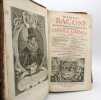

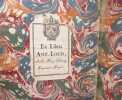

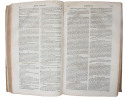
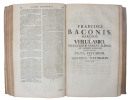
![Operum moralium et civilium.... - [LARGE-PAPER COPY - FIRST ED. IN LATIN OF ""NOVA ATLANTIS"" AND THE ""ESSAYS""]. "BACON, FRANCIS.](https://static.livre-rare-book.com/pictures/LLX/46277_3_thumb.jpg)
![Operum moralium et civilium.... - [LARGE-PAPER COPY - FIRST ED. IN LATIN OF ""NOVA ATLANTIS"" AND THE ""ESSAYS""]. "BACON, FRANCIS.](https://static.livre-rare-book.com/pictures/LLX/46277_4_thumb.jpg)
![Operum moralium et civilium.... - [LARGE-PAPER COPY - FIRST ED. IN LATIN OF ""NOVA ATLANTIS"" AND THE ""ESSAYS""]. "BACON, FRANCIS.](https://static.livre-rare-book.com/pictures/LLX/46277_5_thumb.jpg)



